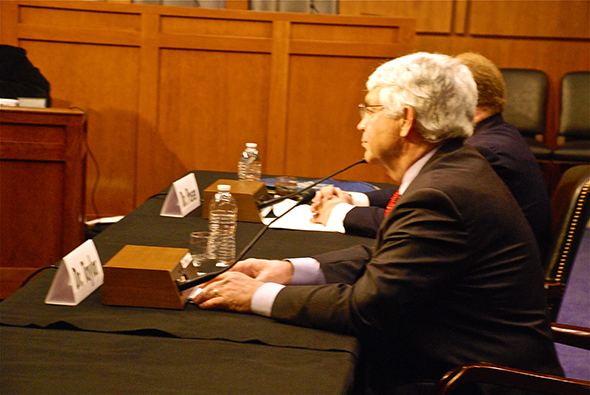
Stanford economist John Taylor warns Congress about the Fed’s “harmful” policies.
(Megan Hickey/MEDILL NEWS SERVICE)
WASHINGTON — Stanford economist John Taylor, testifying Thursday before the Joint Economic Committee of Congress, said the Federal Reserve’s current monetary policy will fail to close the current growth gap, setting the stage for Fed Chairman Ben Bernanke’s testimony to the committee next month.
Taylor said the Fed’s “discretionary and highly unpredictable changes in policy” have been harmful to the economy, citing the current $1.3 trillion dollar gap in real and potential gross domestic product.
“It’s hard to make the case that these policies are working,” said Taylor, who is widely known as the creator of the so-called “Taylor Rule,” which governs changes to nominal interest rates based on economic conditions.
Taylor blamed the anemic recovery, in part, on the shift from rules-based policy to “unprecedented” discretionary actions such as the Fed’s policy of quantitative easing through the purchases of Treasury bonds and mortgage-backed securities.
“The interventions have been accompanied by disappointing outcomes,” Taylor said. “The Fed’s growth forecasts, based on policies, have consistently proved overly optimistic.”
But Adam Posen, president of the Petersen Institute for International Economics, argued that the Fed’s current policies are instead quite conventional. He pointed to a 200-year history of central banks buying and selling a wide range of assets – much like today’s round of quantitative easing.
“There seems to be this horror of a central bank that actually tries to do its job and adapt to the circumstances,” Posen said. “I think that’s a mistake.”
Both economists agreed on a need for increased, but limited, congressional oversight.
“Let Congress and the president determine the combination of budget, tax, regulatory and trade policies that will boost real economic growth to close the growth gap,” said the committee’s chairman, Rep. Kevin Brady, R–Texas.
Taylor emphasized, though, that Congress’ role should be limited and not interfere in the day-to-day operations of the Fed. Congress should be made aware of the reason behind changes to policy instruments to increase transparency and understanding, he said.
“So while discretion would be constrained, it would not be eliminated,” Taylor said.
Posen agreed with a limited approach. “It is right for elected officials to set the goals, but it is wrong for elected officials to interfere with the instruments,” he said.
Bernanke will have an opportunity to respond to proposals for reform when he testifies to the Joint Economic Committee next month.
